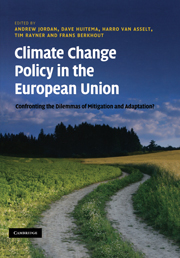Book contents
- Frontmatter
- Contents
- Foreword
- Preface
- List of contributors
- List of abbreviations
- Part I Introduction and overview
- Part II The evolving governance context: the European Union
- 2 Governing the European Union: policy choices and governance dilemmas
- 3 The evolution of climate policy in the European Union: an historical overview
- Part III Climate policy in the European Union: understanding the past
- Part IV Climate policy in the European Union: future challenges
- Part V Climate policy in the European Union: retrospect and prospect
- Index
- References
3 - The evolution of climate policy in the European Union: an historical overview
Published online by Cambridge University Press: 05 August 2011
- Frontmatter
- Contents
- Foreword
- Preface
- List of contributors
- List of abbreviations
- Part I Introduction and overview
- Part II The evolving governance context: the European Union
- 2 Governing the European Union: policy choices and governance dilemmas
- 3 The evolution of climate policy in the European Union: an historical overview
- Part III Climate policy in the European Union: understanding the past
- Part IV Climate policy in the European Union: future challenges
- Part V Climate policy in the European Union: retrospect and prospect
- Index
- References
Summary
Introduction
Having set out the main aims and objectives of this book (Chapter 1), and described the context in which important policy choices have been – or will in the future be – made in the EU with respect to climate change (Chapter 2), the main aim of this chapter is to summarise how European climate policy has evolved over time. The chief reason for doing this is to provide a clearer sense of the historical context in which choices were made in the five sub-areas of climate policy selected for more detailed analysis in Part II. The next section very roughly divides this history into six main time periods. The final section identifies some broad patterns and briefly relates them back to the main features – both formal and informal – of the EU's governance framework.
The evolution of EU climate policy
Pre-1988: the first stirrings of scientific concern
Concern about global climate change dates back as far as the 1950s, but until the 1970s it was mainly regarded as a scientific issue with little if any policy relevance. The 1972 Stockholm Conference agreed to intensify scientific research, a task later taken up by the newly created United Nations Environment Programme (UNEP) (Sjöstedt 1998: 233). In 1979, UNEP and the World Meteorological Organisation (WMO) organised the First World Climate Conference (Pallemaerts and Williams 2006: 22). However, it conspicuously failed to attract any policy makers (Bodansky 2001: 24).
- Type
- Chapter
- Information
- Climate Change Policy in the European UnionConfronting the Dilemmas of Mitigation and Adaptation?, pp. 52 - 80Publisher: Cambridge University PressPrint publication year: 2010
References
- 17
- Cited by



